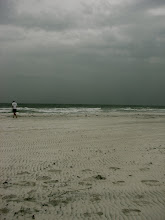So, Brock's dad was the owner, he ran the shop and made the big decisions, but beneath him was his right-hand man--and I can't recall his name right now, but we'll call him Herman--the shop foreman. This guy, Herman, was middle-aged, balding, had a family. He had worked for Brock's father for many years and was in line to buy the shop and business when Brock's father retired (a retirement which was, in my impression, always imminent but never quite there year after year). Herman probably had a high school education. I'm not trying to say he was stupid, because he wasn't. He was a quiet guy, really, soft spoken, a nice guy, but he also had an edge about him, a side that you could tell was hidden--he had more to him than he revealed at first. Anyway, I had no problem with Herman. I recall a story Brock told me about him: Herman was driving out across the west, moving from somewhere--this was in the 1950's or 60's or something--driving across the vast western states and in Montana his car broke down; I think he had his wife with him, possibly a child; a man stops to help him with the car and, seeing how Herman handled the situation, right then and there offers him a job to work his ranch, to be the foreman for the ranch--Herman didn't take the job, but I found that a strange thing, to be offered a job because your own car broke down.
Anyway, the shop would always take a coffee break at 10am. The whole business would stop and we'd all gather together in the small front break room for free coffee, maybe a snack. It was that kind of business--friendly, family-like. What I remember was that, after the break, I went back to my machine, got it going and watched it make its canned salmon labels or Seattle Opera pamphlets or whatever it was making at the time and Herman was standing near me finishing a soda and suddenly he balls up the can and violently throws it into the small trash can near the door. I see this out of the corner of my eye, but more than that I hear the balled metal can crash into the metal trash can and it made me jump. I mean, the printer machine is clacking along, loud and in rhythm (it always made the song Cecelia by Simon and Garfunkle get stuck in my head) but the can smashing in the trash is big enough to startle me. And so I jump and look over at Herman and he looks at me and he's got this very stern and angry look on his face, anger and despair, and I just shrug and go back to attending my machine, but that's when and where and how I had a different opinion on Herman's character. I could tell that he'd been thinking of something other than just tossing away a can.
A small thing, but I saw and heard how he line-drived that can into the wastebasket.
What I found out later was--this was the start of Seattle's housing/real estate boom--Herman had put his house up for sale, on his own, I think, as a lark maybe, and it had been snatched up in one day. He had sold his house without thinking it through, had probably asked too little on the price, and now he had to find a new place to live (and prices were rising). Ah. Herman had screwed up. But to me, it was more than that. He had mistakenly sold his house, but he was also tied to a print shop that wasn't his--a small business where he was always promised something that seemingly wouldn't come--and he had to work day in and out in this noisy little place as the second banana. Like that ranch job he'd been offered, where he would have been the second banana--the ranch owner saw this in him, that he'd make a great second-in-command, the bridesmaid but never the bride--he was or had been a second banana all his life. (This is my pop-psychology analysis anyway.) So, there was a lot of anger and despair built up in Herman and it came out as he so violently--and out of the blue--threw that can into the trash.
He finally did get to buy the business--many years later--just in time for the advent of computerized and electronic printing.

No comments:
Post a Comment